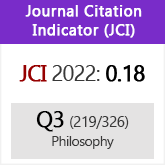Promiscuous obedience: María Zambrano, Judith Butler and Bonnie Honig reading Antigone
DOI:
https://doi.org/10.3989/isegoria.2024.70.1430Keywords:
Antigone, exile, mourning, natality, promiscuous obedienceAbstract
The present text approaches the figure of Antigone through the diverse receptions that this figure has had in feminist theory, particularly in María Zambrano, Judith Butler and Bonnie Honig, insofar as in each of them, besides an interpretation, there is a model of political action and confrontation with institutionality. Exile, mourning and natality, models that we identify in each of these authors, appear as three different models, but that in the analysis are revealed closer and more porous to the possible crossings. Finally, we propose, from the concept of “promiscuous obedience” used by Butler, a possible feminist answer to the irresoluble conflict with institutional power.
Downloads
References
Athanasiou, Athena. Agonistic mourning. Political Dissidence and the Women in Black. Edimburgo: Edinburgh University, 2017.
Behiels, Lieve. “Antígona y sus hermanos. Sobre la tumba de Antígona de María Zambrano”. Tintas. Quaderni di letterature iberiche e iberoamericane, 10 (2021), pp. 45-56.
Berlant, Lauren. El optimismo cruel. Buenos Aires: Caja Negra, 2020.
Butler, Judith. El grito de Antígona. Barcelona: El Roure, 2001.
Butler, Judith. Marcos de guerra. Barcelona: Paidós, 2010.
Butler, Judith. “Rethinking vulnerability and resistance”, en Vulnerability in resistance. Judith Butler, Zeynep Gambetti y Leticia Sabsay eds. Duke University, 2016.
Butler, Judith. Cuerpos aliados. Buenos Aires: Paidós, 2017.
Butler, Judith. La fuerza de la no violencia. Barcelona: Paidós, 2020.
Butler, Judith. Vida precaria. El poder del duelo y la violencia. Barcelona: Paidós, 2006.
Elizalde, María Isabel, “Significados de exilio en María Zambrano”. Bajo palabra. Revista de Filosofía. II Época, n.º 7 (2012), pp. 485-494.
Galindo, María. Feminismo bastardo. Santiago de Chile: USACH, 2022
Honig, Bonnie. Antigone, interrupted. Cambridge: Cambridge University, 2013.
Honig, Bonnie. “The Antigone-effect and the Oedipal curse. Toward a precarious natality”. philoSOPHIA, vol. 5, n.º 1, Winter (2015), pp. 41-49.
Honig, Bonnie. A feminist theory of refusal. Cambridge Mass: Harvard University, 2021.
Irigaray, Luce. Espéculo de la otra mujer. Madrid: Akal, 2007.
Kramer, Sina. “Judith Butler’s ‘New Humanism’: A Thing or Not a Thing, and So What?” philoSOPHIA: A Journal of Continental Feminism, 5, n.º 1 (2015): pp. 25-40.
Lorenzano, Sandra y Chirinos Bravo, Karín (eds.). Antígonas de América Latina: Po/éticas y políticas en diálogo. Milán: Di/Segni, 2022.
Morenilla, Carmen y Llagüerri, Núria. “La ‘Antígona’ de Eurípides y el P. Oxy. 3317”. Euphrosyne: Revista de filología clásica, n.º 47 (2019), pp. 9-30.
Peña, María Isabel. “Antígona, de mito androcéntrico a símbolo feminista. Una reflexión”. Ideas y Valores, vol. 70, n.º 175 (2021), pp. 47-72.
Söderbäck, Fanny, ed. Feminist Readings of Antigone. State University of New York Press, 2012.
Sófocles. “Antígona”, en: Tragedias. Madrid: Biblioteca Clásica Gredos, 1992, pp. 239-299.
Soto, Pamela. María Zambrano. Los tiempos de la democracia. Barcelona: Editorial Herder, 2023.
Zambrano, María. Claros del bosque. Barcelona: Seix Barral, 1977.
Zambrano, María. La tumba de Antígona. Barcelona: Anthropos, 1989.
Zambrano, María. “Amo mi exilio”, en Obras Completas, vol. VI. Barcelona: Galaxia Gutenberg, 2016, pp. 777-779.
Zambrano, María. Los bienaventurados. Madrid: Alianza, 2022.
Published
How to Cite
Issue
Section
License
Copyright (c) 2024 Consejo Superior de Investigaciones Científicas (CSIC)

This work is licensed under a Creative Commons Attribution 4.0 International License.
© CSIC. Manuscripts published in both the printed and online versions of this Journal are the property of Consejo Superior de Investigaciones Científicas, and quoting this source is a requirement for any partial or full reproduction.All contents of this electronic edition, except where otherwise noted, are distributed under a “Creative Commons Attribution 4.0 International” (CC BY 4.0) License. You may read here the basic information and the legal text of the license. The indication of the CC BY 4.0 License must be expressly stated in this way when necessary.
Self-archiving in repositories, personal webpages or similar, of any version other than the published by the Editor, is not allowed.
Funding data
Fondo Nacional de Desarrollo Científico y Tecnológico
Grant numbers 1230985
Universidad Técnica Federico Santa María
Grant numbers USM-2023: PI_LIR_23_15














